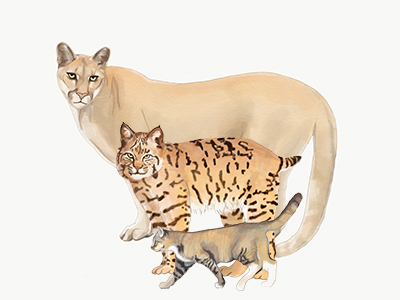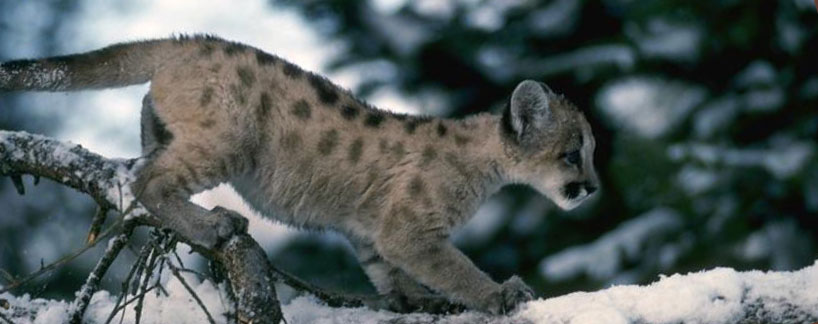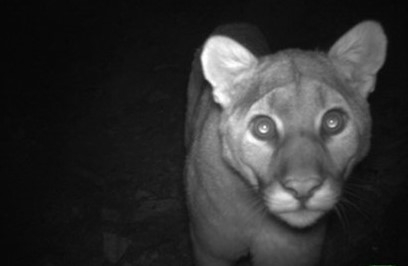Introduction
In California, mountain lions (Puma concolor) have a unique management history among western states.
- 1972: Mountain lion hunting moratorium implemented due to declining populations.
- 1986: Mountain lions listed as a game species, though no hunting occurred.
- 1990: Mountain lions became a specially protected species with the passage of the California Wildlife Protection Act (Proposition 117). Proposition 117 established some exemptions for the take of mountain lions to preserve public safety; protect private property and livestock; and to protect federally listed bighorn sheep populations.
- 2015: CDFW formally established the Mountain Lion Conservation Program to coordinate statewide research, species health, population monitoring, and collaboration with external collaborators.
- 2020: The Fish and Game Commission listed mountain lions as a candidate species under the California Endangered Species Act within a proposed evolutionarily significant unit (ESU) in the central coast and southern California. CDFW is completing a species status review within the proposed ESU.
Species Identification
 Body size comparison of mountian lion, bobcat, and domestic cat.
Body size comparison of mountian lion, bobcat, and domestic cat.
Size & Appearance
Adult mountain lions have a tawny, tan or slightly reddish color with white underbelly, black tipped muzzle, ears and tail. Mountain lion kittens have brown-blackish spots that begin to fade at 3 months of age.
Mountain lions are sometimes mistaken for bobcats or domestic cats (and vice versa). However, mountain lions are much larger animals with longer tails compared to bobcats with their short “bobbed” tails.
Body size differences between adult mountain lions and bobcats
| Species |
Sex |
Body Length with Tail (feet) |
Tail Length (inches) |
Shoulder Height (inches) |
Body Weight (pounds) |
Tracks (inches) |
| Mountain Lion |
MaleFemale |
7-8
5-7 |
Up to 36 |
Up to 30
Up to 25 |
Up to 170
Up to 120 |
Up to 4 inches wide |
| Bobcat |
Male
Female |
2-3.5
2-3 |
Up to 7 inches |
Up to 22
Up to 20 |
20-35
15-25 |
Up to 2 inches wide |
Biology & Ecology
Mountain lions are the second largest cat (in terms of body size) in North America after the jaguar. Mountain lions are considered one subspecies and called different names depending on where you live. People often call them mountain lions in California, cougars across western North America, panthers in Florida, and pumas in Mexico, Central and South America.
- HABITAT: Redwood and mixed forests, coastal brushlands, and mountains. Around 40% of California is considered suitable habitat for mountain lions.
- SPACE USE: Females have territories up to 300 square miles. Males have territories up to 500 square miles that can overlap with several females and will defend their territory from other males.
- VOCALIZATION: Mountain lions can growl, chirp, yowl (“caterwaul”), snarl, and hiss. Mountain lions cannot roar, but they can purr like other small cats.
- REPRODUCTION: Females can have kittens, 2-4 kittens per litter, any time of the year. The average gestation period is 3 months.
 Mountain lion kitten walking in snow.
Mountain lion kitten walking in snow.
Behavior & Diet
Mountain lions are solitary and elusive. A group of mountain lions seen together is not a “pack”, but often, a mother with offspring. Kittens stay with their mother for 18-24 months.
Mountain lion diets mostly consist of large animals such as deer, elk, pronghorn, bighorn sheep, wild pigs, feral horses and burros. They will alter their behavior in response to environmental conditions, prey availability, and competiting large carnivores. They may opportunistically hunt other animals including poultry, small livestock, or pets.
Mountain lions are ambush predators that rely on the element of surprise while hunting. Signs of predation by a mountain lion:
- Bite marks to back of neck or skull.
- Fur plucked cleanly in tufts—fur removed before feeding.
- Drag marks leading away from the kill site to a more secluded area
- Carcass covered with dirt, vegetation, or snow to hide it from scavengers (“cache” site).
Species Health
Disease and Rodenticide Surveillance
CDFW conducts disease and rodenticide surveillance statewide to better understand mountain lion population and species health. CDFW staff are specialty trained to collect biological samples from live animals, such as blood, tissue, saliva, scat (feces), and hair. as well as to perform postmortem examinations (necropsies) on dead animals. Biological samples are used to study diseases of conservation concern and emerging diseases.
The CDFW Wildlife Health Laboratory in coordination with its partner laboratories (California Animal Health and Food Safety Laboratory and San Diego Zoo Wildlife Alliance) perform postmortem examinations (necropsies) on dead mountain lions to determine causes of death or illness.
Genetic Health & Connectivity
CDFW works to increase our knowledge of mountain lion population structure, genetic diversity, landscape use and barriers to movement, and species response to environmental changes. Roads are a major barrier for wildlife to move between areas of suitable habitat. The dense network of roads around and within cities limits the ability of mountain lions to safely disperse to new areas which reduces gene flow and can increase inbreeding risks. Research is needed to identify where wildlife crossing structures—such as overpasses or underpasses—can be built to improve connectivity between habitats.
Wildlife Rehabilitation
CDFW may respond in the field to orphaned, injured, or sick mountain lions to protect animal welfare, native wildlife, human health and safety. CDFW works with agency partners and permitted wildlife rehabilitation facilities with specialty rehabilitation authorization (large carnivores). Animals are assessed on a case-by-case basis to determine the most appropriate option. Depredation and public safety wildlife are not candidates for rehabilitation or captive placement.
CDFW staff collect and analyze data to assess the outcome of these efforts and to inform the best practices, policy, and guidelines. Learn more about The California Native Wildlife Rehabilitation Program.
Human-Mountain Lion Interactions
Human population growth along the wildland-urban interface has also resulted in small land parcels that often contain pets, poultry, and livestock. These factors can lead to potential conflict. A property owner whose livestock or pets have been injured or killed by a mountain lion (depredation) and can request a depredation permit to “take” the offending animal pursuant to Fish and Game Code Section 4802. CDFW prioriitizes non-lethal approaches, as feasible. Permitholders must report mountain lion take to CDFW, even if no animals were taken under a depredation permit.
CDFW collects and manages mountain lion depredation data, including an annual mountain lion depredation necropsy report to the Fish and Game Commission and depredation summary tables. Data may be subject to change as new information becomes available. In some years, more animals were reported as being taken than the number of permits issued (e.g., multiple mountain lions could be taken on a single permit prior to 2013).
IMPORTANT: Reporting errors may make these data unreliable for identifying trends or making geographical comparisons without using a quanitative model that accounts for these inconsistencies.
Mountain lions attacks on humans are rare. Since 1890, there have been six known fatal human attacks by mountain lions in California. If a mountain lion is declared a public safety threat, CDFW and local law enforcement work quickly to remove any threat.
 Up close camera trap photo of a mountain lion.
Up close camera trap photo of a mountain lion.
Statewide Program
CDFW Research
CDFW conducts research focused on mountain lion biologiy, ecology, conservation and management. Research priorities include: habitat connectivity, species interactions, livestock depredation, genetics, health and disease monitoring, and human dimensions.